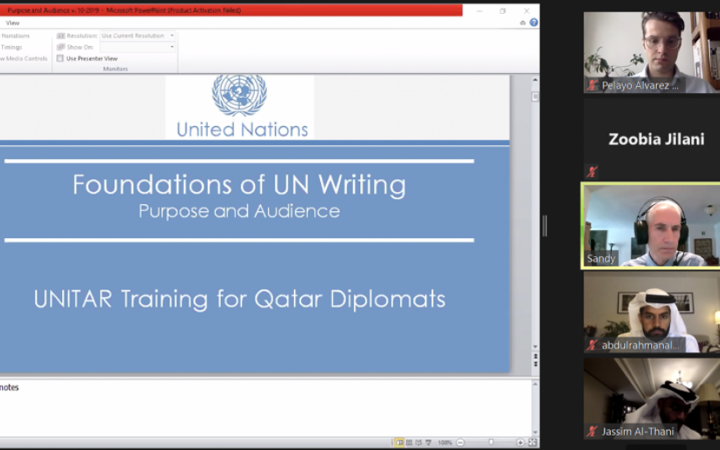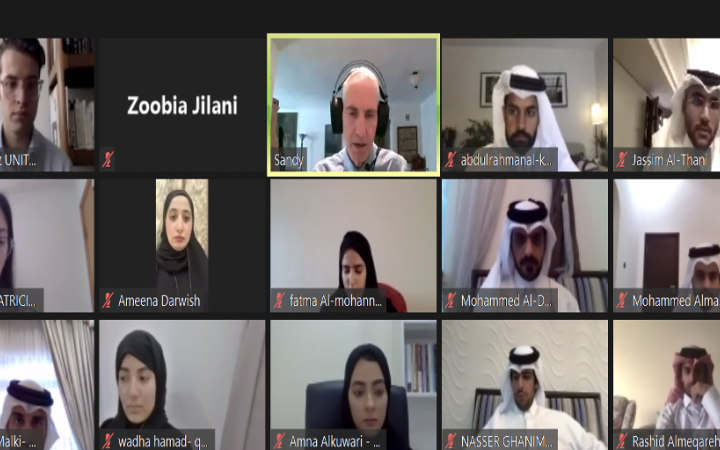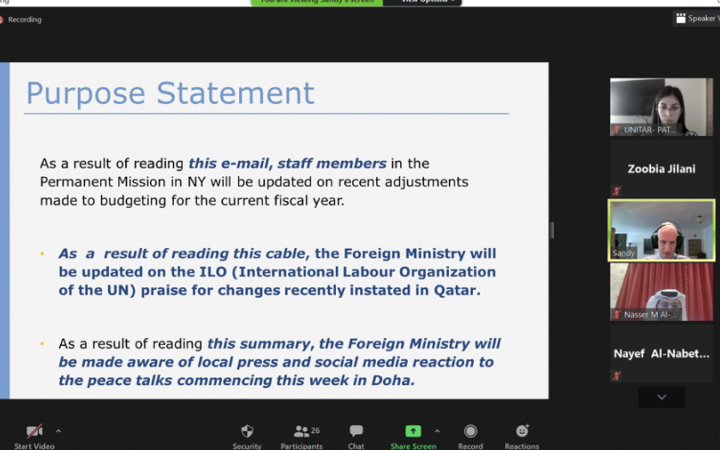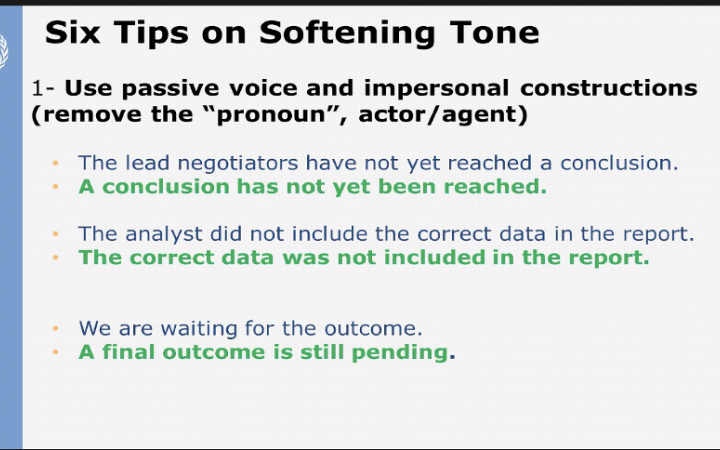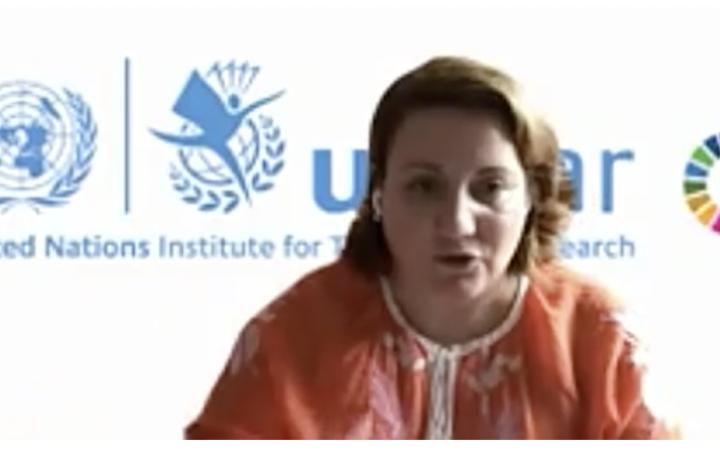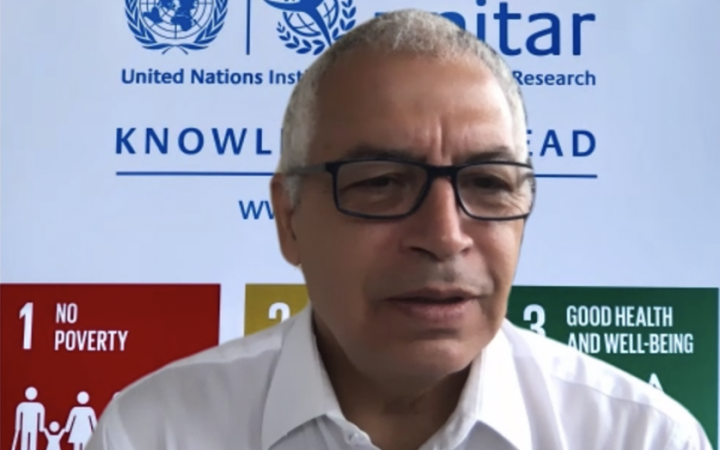16 September 2020, New York, USA, Video Conferences - The United Nations Institute for Training and Research New York Office (UNITAR NYO) rolled out its “Foundations of UN Writing” course on 16 September. This training is designed to prepare the diplomatic staff of the Permanent Mission of Qatar to the United Nations with the necessary knowledge of guidelines and best practices for writing while performing their duties at the United Nations.
Mr. Pelayo Alvarez from UNITAR NYO opened the workshop and greeted the delegates in attendance before passing the stage over to the workshop’s facilitator, Sandy Singer, Lecturer of Communication, Columbia University School of Professional Studies. Mr. Singer discussed the overall goals of the workshop: to communicate best practices for writing as Qatari delegates. Singer outlined the structure of the training which was organized as follows: Part One covered audience purpose awareness, concise language clarity, and sentence & paragraph parameters; Part Two covered tone and graduations, using hedgers and qualifiers to remain diplomatic, gender inclusive language, and the UN Editorial Manual; Part Three covered diplomatic writing and tone management.
Mr. Singer introduced the delegates to what is considered best practices for writing documents while working at the UN - most critically the ability to deliver a brief overview of a given topic. The training emphasized the importance of understanding both the purpose of a delegate’s writing and the designated audience which shapes the resulting content and tone, among other variables including deadlines, length limitations, templates, and supervisor preferences.
Following this discussion, the training then delved into the makings of a Purpose Statement, taking the delegates through multiple exercises to help practice writing a comprehensive Purpose Statement, showcasing desirable models to emulate. Some of the suggested revisions included shorter sentences, using “I” & “we” to engage readers, and utilizing action-oriented verbiage. Singer emphasized the importance of stating your intended purpose early in the document and tailoring your content to your audience’s needs.
A short break commenced after Part Two, which was followed by a discussion of how to effectively communicate potentially negative or critical opinions without damaging diplomatic relations. Choosing positive and/or neutral construction and vocabulary was highlighted as an optimal path forward. Singer also covered six tips of softening the tone of one’s writing which included the following: use passive voice and impersonal construction, use euphemisms & words that leave room for interpretation, add qualifiers, hedges, and other softeners, use less negative language and ensure the language is gender-sensitive.
Mr. Alvarez concluded the training and briefed the delegates on the upcoming sessions.
Ms. Jelena Pia-Comella, former DPR of Andorra and Deputy Executive Director at the International Coalition of the Responsibility to Protect. She introduced the diplomats from Qatar to the three pillars of the Responsibility to Protect norm which include the responsibility of the state to protect its population from mass atrocities, the commitment of the international community to assist in protection and capacity building in states, and the international community’s responsibility to take action when a state is unable or unwilling to protect its population. She further highlighted the challenges of demystifying the norm and particularly the last pillar, which is often viewed unfavorably. To implement the third pillar of the Responsibility to Protect, she urged the conduct of preventive diplomacy that allows for the peaceful and early resolution of conflict. Tools for implementation she highlighted included mediation panels of experts, peace keeping operations and political missions.
The closing module shifted the emphasis from negotiations to voting practices, rules of procedures, and the right of reply. Mr. Larry Johnson, adjunct professor of law at Columbia Law School and the former Assistant Secretary-General in the Legal Affairs led the whole-day session, offered insight on his experience working at the UN to the Qatar delegates. This workshop provided training on how to draft a UN Resolution, starting from the rules and terminology, to the process of underpinning its adoption. By the conclusion of this Module, Qatar delegates had a better understanding of the structure of UN resolutions. Rules and practices relating to the adoption of resolutions and decisions were also covered during the session.
Mr. Suazo closed the session wishing the participants a successful assignment service as delegates of the Permanent Mission of the State of Qatar to the United Nations, and sharing his personal advice and takes given his experience in the multilateral arena and the United Nations System. The training concluded and the 22 participants attending the workshop received an official certificate from UNITAR, Head of New York Office office encouraged all participants to reach out in the future and reassured UNITAR will be there as a source of knowledge and support during their tenure at the Headquarters.


